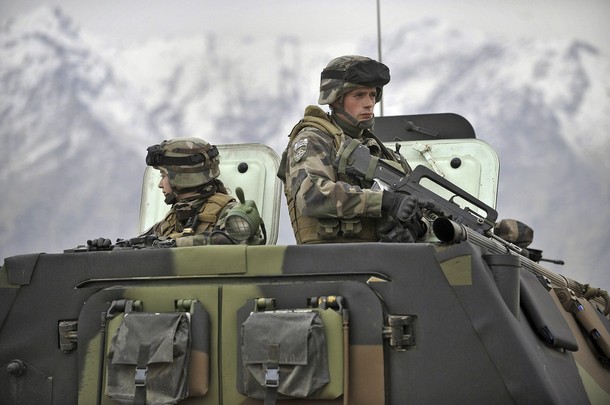France’s new White Book on defense and national security offers no radical thinking on the future posture and structure of France’s military and national security establishment, maintaining previous strategic ambitions and positions even in the face of a faltering economy. This is both good news and bad news for Washington and other major French allies. On the plus side, the document articulates France’s enduring global ambitions and intention to maintain a full-spectrum military to back them up. Yet by clinging to sacred cows like the nuclear deterrent and autonomy of decision making and action, France risks hollowing out its true fighting capabilities at a time of intense fiscal pressures.
From an American perspective, there is plenty to like. The White Book outlines a coherent and thoughtful survey of the current and future geopolitical environment. It lucidly analyzes the myriad of challenges in the global security environment, focusing in particular on the rise of interstate competition in Asia, the risk of fragile and failing states, and the complex security challenges brought about by globalization. The document does Europe a service by offering a frank and astute assessment of these threats and describing how they impact French and European interests.
The document also astutely appreciates and anticipates the implications for Europe of the American ‘pivot’ to Asia. It outlines France’s strategic priorities as homeland defense; security in the Euro-Atlantic area; security in Europe’s larger neighborhood; participating in the stability of the Persian Gulf; and contributing to global peace and security. This should be music to the ears of American policymakers looking for Europe to assume greater responsibility for security in its neighborhood. Moreover, by committing to the security of the Persian Gulf, France is also aware that ‘the pivot’ and growing US energy resources may reduce America’s appetite to guarantee Gulf security.
The White Book’s emphasis on cybersecurity, intelligence, special forces, and drones foreshadows areas of possible enhanced cooperation with the United States. By focusing on these capabilities, France’s ultimate aim is to enhance its autonomy of decision-making and action, supporting traditional Gaullist doctrine. Yet these investments have multilateral benefits as well. They will help address critical capabilities shortfalls in NATO— which require increasingly reluctant US assistance in operations, particularly on drones and intelligence.
The White Book also is positive for what it says—or doesn’t say—about NATO. It reaffirms that the debate about France’s return to NATO’s integrated military command is closed. This presidential decision was in effect taken last year when Socialist party foreign policy heavyweight Hubert Védrine issued a report on behalf of the government in favor of France remaining fully in NATO. Yet it is significant for a Socialist president to make clear in his premier defense document that his government favors an active, energetic, reintegrated France in NATO. France’s ambition to maintain a full spectrum, high-intensity combat force is another plus, but the ultimate posture decisions are a drawback. France avoided the radical decisions taken by some of its European neighbors in their own posture and force structure choices. France’s document downsizes its air and ground forces, but does not eliminate any core capabilities, such as the Netherlands scrapping its armor or the UK temporarily abandoning its carrier capability.
The open question for Washington and other European allies is whether budget cuts have forced France to downsize its force too much to bear an appropriate share of the burden in future ground operations. The White Book cuts the level of French forces capable of a major long-term deployment to 15,000, a substantial cut from an earlier target of 30,000. The total number of deployable forces will be cut from 80,000 to 66,000 making the army the biggest loser. This has to concern the US and NATO officials, who fear a post-Afghanistan reduction in European deployable forces.
The decision to cut deployable forces is emblematic of the ultimate drawback of the White Book: resource constraints. By failing to reduce its strategic ambitions at a time of austerity, France risks creating a well-trained and capable force, but one which is ultimately too small to meet the growing operational demands of the future security environment. While the document is ultimately pragmatic on the question of NATO integration and European defense, it is highly orthodox in how it treats national independence, sovereignty, and the sanctity of nuclear weapons— the traditional Guallist sacred cows. These areas were ringfenced in the defense strategy, but at great cost to size of the air force and the army’s deployable forces. Maintaining a robust national industrial base, an independent nuclear arsenal, and the intelligence and military capabilities to take independent decisions is costly. The open question is whether Paris preserved these strategic capabilities at the cost of diminishing its operational firepower.
The White Book ultimately pledges that France will hold the line on defense spending over the next six years, at roughly 31 billion Euros per year. This is a major victory for the armed forces and defense minister Jean-Yves Le Drian, who successfully leveraged his close ties to the president to save the military from more substantial cuts. But the military is not out of the woods yet. Dark clouds are on the horizon for the French economy and further cuts loom for government spending. With the current government’s popularity in a free fall, the temptation will be strong to steal future resources from defense rather than an increasingly grumpy French public.
Jeff Lightfoot is deputy director of the Brent Scowcroft Center on International Security.
Image: reuters%206%2010%2010%20French%20soldiers%20Afghanistan.jpg
